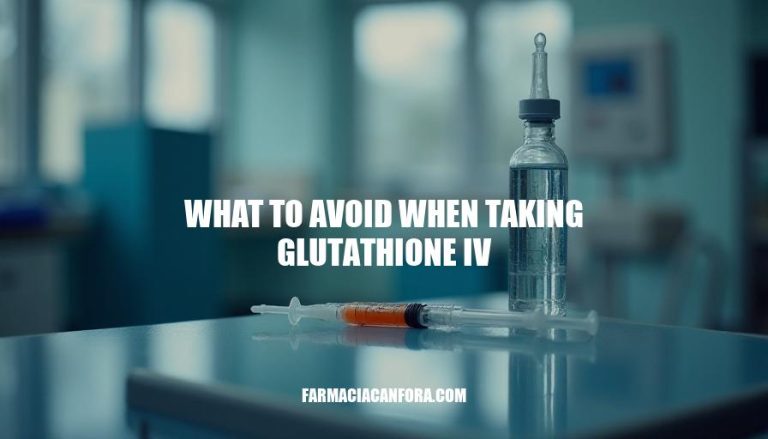


When considering glutathione IV therapy, it’s crucial to understand what to avoid to ensure safety and effectiveness. Glutathione, a powerful antioxidant, can interact with certain substances and medications, potentially leading to adverse effects. Being aware of these interactions and side effects helps in maximizing the benefits while minimizing risks.
Alcohol should be avoided when taking glutathione IV due to its significant impact on oxidative stress and liver detoxification.
Oxidative Stress: Alcohol metabolism generates free radicals, which deplete glutathione levels. This depletion increases oxidative stress, as glutathione is a key antioxidant that neutralizes free radicals.
Liver Detoxification: The liver uses glutathione to detoxify harmful substances, including alcohol. When alcohol is consumed, it depletes glutathione, impairing the liver’s ability to detoxify effectively. This can lead to the accumulation of toxins and increased liver damage.
Avoiding alcohol helps maintain optimal glutathione levels, ensuring effective detoxification and reducing oxidative stress.
Smoking depletes glutathione levels by increasing oxidative stress, which uses up antioxidants like glutathione to combat the damage. This depletion leads to an imbalance between reactive oxygen species and antioxidants, causing further oxidative stress and inflammation. Additionally, smoking exacerbates inflammation and decreases lung function, making it harder for the body to maintain adequate glutathione levels.
Avoiding smoking while taking glutathione IV helps ensure the supplement can effectively support your body’s antioxidant defenses and reduce inflammation.
Caffeine affects the body in several ways:
Regarding glutathione IV therapy, caffeine should be avoided because both substances are metabolized by the liver. Caffeine can induce certain liver enzymes, potentially altering the metabolism of glutathione and reducing its effectiveness. This interaction can also increase the workload on the liver, potentially leading to liver stress or damage.
Here are specific medications to avoid when taking glutathione IV, along with their potential interactions and side effects:
Acetaminophen (Paracetamol):
NSAIDs (e.g., Aspirin, Ibuprofen):
Chemotherapy Drugs:
Immunosuppressants:
Oral Contraceptives:
Heavy Metals (e.g., Lead, Mercury):
Nitrates (e.g., Nitroglycerin):
Aspartame:
Always consult with a healthcare professional before starting or stopping any medication while on glutathione IV therapy.
Excessive dairy intake should be avoided when taking glutathione IV because it can interfere with the absorption and effectiveness of the treatment. Dairy products contain calcium, which can bind to glutathione and reduce its bioavailability. This binding can prevent glutathione from being effectively absorbed into the bloodstream, diminishing its antioxidant benefits. Additionally, dairy products often contain additives and preservatives that may burden the detoxification pathways, further reducing the efficacy of glutathione IV therapy.
Avoiding aspartame when taking glutathione IV is important due to its impact on glutathione levels and overall health. Aspartame, an artificial sweetener, can alter the liver’s transculturation pathway, which is crucial for glutathione metabolism. This alteration can inhibit detoxification processes, deplete glutathione levels, and increase inflammation. Lower glutathione levels can reduce the body’s ability to combat oxidative stress, affecting overall health and potentially diminishing the benefits of glutathione IV therapy.
Artificial food dyes should be avoided when taking glutathione IV because they can cause oxidative stress and reduce the effectiveness of glutathione. These synthetic dyes, such as Yellow 6 and Red 40, have been shown to decrease glutathione-s-transferase enzymes, which are crucial for detoxification. This reduction in enzyme activity can lead to increased oxidative stress, counteracting the antioxidant benefits of glutathione. Additionally, the presence of these dyes can deplete glutathione levels, making the IV treatment less effective.
It’s best to choose dye-free or naturally dyed products to avoid these negative interactions.
When considering glutathione IV therapy, it’s essential to avoid certain substances and medications that can interact with glutathione and reduce its effectiveness.
These include:
Additionally, excessive dairy intake and artificial food dyes should be avoided due to their potential to interfere with glutathione absorption and effectiveness.
It’s crucial to consult with a healthcare professional before starting or stopping any medication while on glutathione IV therapy to ensure optimal health benefits.